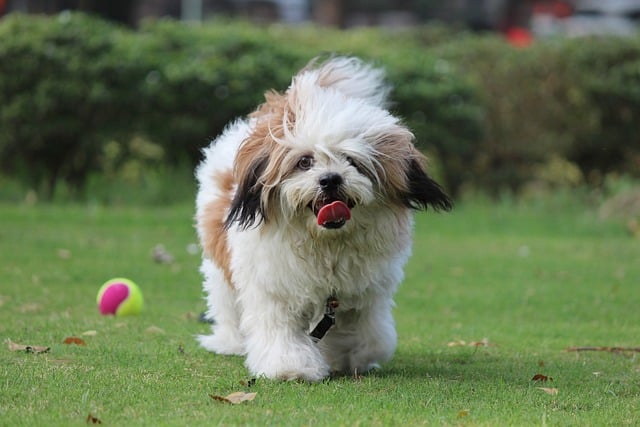Lhasa Apsos are a breed wrapped in history and intrigue, originally hailing from the sacred monasteries of Tibet. Known for their luxurious coats and strong personalities, they are a favorite among dog lovers. However, like many breeds, the Lhasa Apso is often subject to myths and misconceptions that don’t do justice to their true nature. Here are five common myths about Lhasa Apsos that need to be debunked.
Myth 1: Lhasa Apsos Are Always Aggressive
One of the most damaging myths about Lhasa Apsos is that they are inherently aggressive. This misconception likely stems from the breed’s history as guard dogs in Tibetan monasteries. While it’s true that Lhasa Apsos were bred to be alert and protective, these traits do not automatically translate to aggression.
In reality, Lhasa Apsos can be loyal and affectionate companions when raised in a nurturing environment. They are known to form strong bonds with their families and can be playful and loving, especially with those they trust. Like any dog, improper socialization or mistreatment can lead to behavioral issues, but this isn’t specific to the breed.
Why the Myth Persists
Lhasa Apsos have an independent and assertive nature, which can be misinterpreted as aggressive behavior, especially by people unfamiliar with the breed. They are quick to alert their owners to potential dangers, which can come across as being overly cautious or reactive. However, with proper training and socialization, they are no more aggressive than any other breed.
Myth 2: Lhasa Apsos Don’t Need Much Exercise
Because of their small size and calm demeanor indoors, many people believe that Lhasa Apsos don’t need much exercise. This is a misconception that can lead to health and behavioral issues. Despite their size, Lhasa Apsos are an active breed that requires regular physical activity to stay healthy and happy.
Exercise Needs
Lhasa Apsos have a moderate energy level and enjoy walks, playtime, and mental stimulation. Skipping their exercise routine can result in boredom, which may lead to destructive behaviors. While they don’t need as much exercise as a large working breed, a daily walk and some interactive playtime are essential for their well-being.
Additionally, mental stimulation is just as important as physical exercise for Lhasa Apsos. They are intelligent dogs that enjoy puzzles, training exercises, and games that challenge their minds. When provided with sufficient exercise and mental enrichment, Lhasa Apsos are content and well-behaved.
Myth 3: Lhasa Apsos Are Low Maintenance
Due to their small size and compact frame, some people believe that Lhasa Apsos are low-maintenance dogs. However, this myth couldn’t be further from the truth, especially when it comes to their grooming needs. Lhasa Apsos have long, flowing coats that require regular upkeep to stay healthy and tangle-free.
Grooming Needs
Lhasa Apsos need frequent grooming to keep their coats in good condition. Their long, dense hair is prone to matting if not properly brushed, and they also require regular baths. Many owners choose to have their Lhasa Apso’s coat trimmed to a more manageable length, often referred to as a “puppy cut,” which can reduce the grooming burden but still requires maintenance.
In addition to brushing and bathing, Lhasa Apsos need regular nail trims, ear cleanings, and dental care to keep them in optimal health. Their grooming routine is more involved than many other breeds, so potential owners should be prepared for the commitment.
Myth 4: Lhasa Apsos Are Only Suitable for Experienced Dog Owners
Another common myth is that Lhasa Apsos are too stubborn or difficult for first-time dog owners. While it’s true that they can have an independent streak, this doesn’t mean they are unsuitable for new pet parents. In fact, with the right approach, Lhasa Apsos can make excellent companions for anyone willing to invest time in their training.
Training Lhasa Apsos
The key to training a Lhasa Apso is consistency, patience, and positive reinforcement. They are intelligent dogs that respond well to reward-based training methods but may not always comply with commands immediately due to their independent nature. This trait is often mistaken for stubbornness, but in reality, Lhasa Apsos are simply more thoughtful and deliberate in their actions.
First-time dog owners who are committed to learning about dog behavior and training methods can succeed with a Lhasa Apso. Like any breed, they require time and effort, but their loyalty and intelligence make them rewarding companions for those willing to put in the work.
Myth 5: Lhasa Apsos Aren’t Good With Children
It’s a common belief that Lhasa Apsos don’t get along well with children, but this is a myth. While it’s true that Lhasa Apsos may not be as tolerant of rough handling as some larger breeds, they can form strong bonds with children when introduced properly. The key is teaching both the dog and the children how to interact respectfully.
Lhasa Apsos and Families
Lhasa Apsos can thrive in families with children if the environment is calm and the children understand how to approach and handle dogs gently. These dogs are protective and loyal, and once they form a bond with a child, they can be affectionate and even playful. It’s important for parents to supervise interactions between young children and the dog to ensure that both are safe and comfortable.
Additionally, Lhasa Apsos tend to do better in homes where children are older or understand how to respect the dog’s space and needs. With the right training and socialization, they can be excellent companions for families.

Lhasa Apsos are a remarkable breed with a rich history, but they are often misunderstood due to persistent myths. By debunking these misconceptions, it’s clear that Lhasa Apsos are affectionate, intelligent, and loyal dogs that can thrive in a variety of homes. Whether you’re a first-time dog owner or an experienced handler, a Lhasa Apso can be a wonderful companion if their needs are properly met.
Their grooming and exercise requirements, combined with their independent yet affectionate nature, make them a unique and rewarding breed. If you’re considering bringing a Lhasa Apso into your home, understanding their true temperament and needs will help you build a strong, lasting bond with your new furry friend. Stop believing the myths and start embracing the reality of life with a Lhasa Apso!

 Toledo, United States.
Toledo, United States.